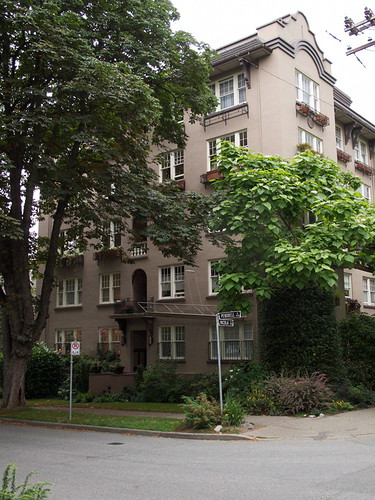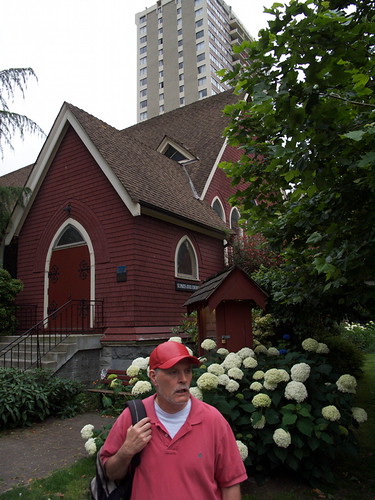How and why is Davie Village a gay neighbourhood? How did gays shape it? And where is it going in the 21st century? All these questions and more were answered last night in a guided history walk hosted by Gordon Price, city councillor from 1986–2002, writer and consultant, who came to Vancouver in 1978 as a fresh-faced gay man.
We started out by English Bay Beach, which was a gay cruising ground back in 1978, known apparently as “the pansy patch.” It wasn’t the only one, though, and gay territories would shift over the years. Cruising spots like parks, beaches and bars were the first gay-identified spaces; it was in these places that gay men explored and celebrated their sexuality, and connected with each other.
(Incidentally: nowadays you could fairly say that everywhere in Davie Village is gay territory.)
Our first stop was corner of Pendrell & Nicola, near Lord Roberts Elementary, where we addressed the question, why here? What made this neighbourhood one that gay men would choose? Well, there were a few factors: lots of rental space (mostly 1-bedroom apartments), plenty of bars and entertainment nearby, and good transit—perfect for a mobile, unattached population with disposable income looking to hook up. You’ll find similar conditions pretty much all gay ghettoes around the world.
We segued into a discussion of the physical history of the Village’s houses and buildings. That street corner was an excellent vantage point to see all the layers, all the decades side by side: a circa-1890 2 ½ storey house just up the street, a lovely 1920’s apartment building on the corner (the Princess Charlotte), plainer highrises built in the 60’s and 70’s… It’s all there.
The Village saw massive construction in the 50’s, 60’s and early 70’s: many of these old homes were razed to make way for modern apartments, communities were displaced, and it was a very traumatic time. But let’s not romanticise the past: these new apartments had running water, electricity, privacy, and at least a kitchenette. Compared to the overcrowded old heritage houses, pretty and historic though they were, this must have been heaven.
Besides, it’s what made it possible for gays to settle here. Can’t argue with results like that.
Next stop: St Paul’s Church, where we discussed the rise of street prostitution in the West End in the 70’s and early 80’s. Long story short, prostitutes (all genders) and their johns were creating a massive nuisance for residents, many of whom by now had a stake in their community, and perceived a very real risk of the Village turning into a red light district. They formed a group, Concerned Residents Of the West End, which succeeded in driving street prostitution out of the West End through some interesting legal tricks. Here again, it was the gays that took charge and reinvented their neighbourhood.
One last short walk, ending up at Bute and Davie. In the shadow of J Lounge and Hamburger Mary’s—checking out the fierce drag queens and pretty muscle boys—we recapped all we’d seen, and asked ourselves where it was all going. Would Davie Village still stay gay? Will young gay men have as easy a time finding a place here as they did 30 years ago?
Bottom line: it’s impossible to tell. The West End has continually reinvented itself, and will continue to do so as long as it exists. New people, new communities, new ideas will pour in; the neighbourhood will absorb them and weave something from the old and the new.
This morning I took the long route to my bus stop, walking up Nicola to Georgia. It was a beautiful stretch, mostly heritage homes and low-rises, until I hit Robson, and then BAM! Back in the big city. The West End is truly a special place, and I feel more connected to it than ever. I am very, very lucky to live where I live, to be part of something like this.
Not a bad way to kick off Pride Week!

